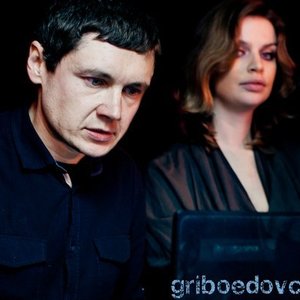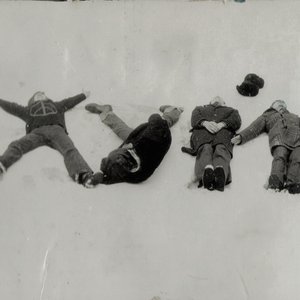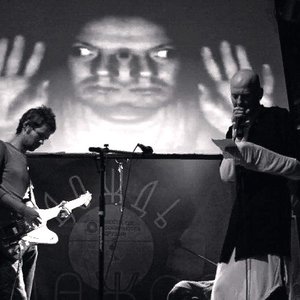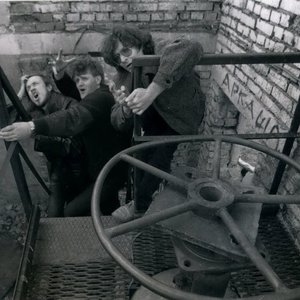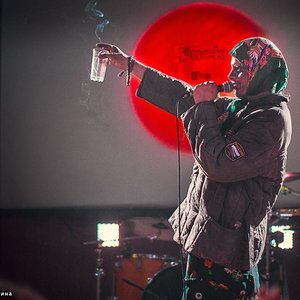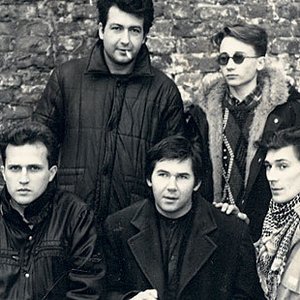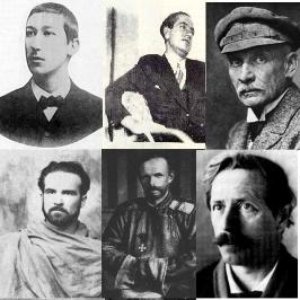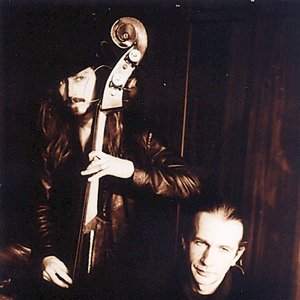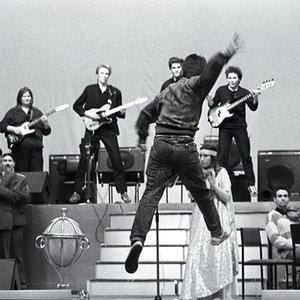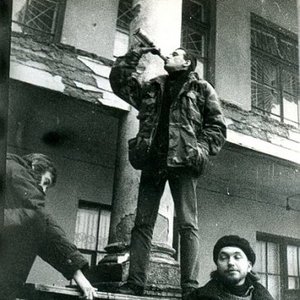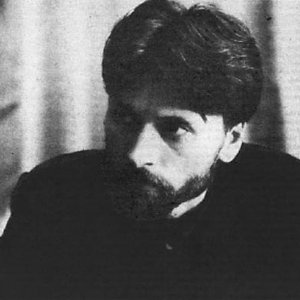Biography
-
Years Active
1980 – 1990 (10 years)
-
Members
- Александр Белоносов
- Алексей Вишня
- Олег Андреев
ДК was formed in 1982 in Moscow. It's name is and was by many, if not most, people believed to be taken from the abbreviation 'DK' for Soviet 'Palaces of Culture' or 'Houses of Culture'. Though this may not be true, it seems probable that the group very well understood that, using simply the abbreviation and not full words, it would often be read as that, and at least for many people associated with these places:
(from wikipedia - -click here to read more): Palace of Culture (Russian: dvorets kultury) or House of Culture (dom kultury) was the name for major club-houses in the former Soviet Union and the rest of the Eastern bloc. The Soviet meaning for the term "club" was an establishment for all kinds of recreational activities and hobbies: sports, collecting, arts, etc., and the Palace of Culture was designed to have room for all kinds of them. A typical Palace contained one or several cinema halls, concert hall(s), dance studios (folk dance, ballet, ballroom dance), various do-it-yourself hobby groups, amateur radio groups, amateur theatre studios, amateur musical studios and bands, lectoriums (lecture halls), and many more. Groups were also subdivided by age of participants, from children to retirees. A public library may sometimes have been housed in the Palace of Culture as well.
All these were supposed to aid "cultural leisure" of Soviet workers and children and to fight "cultureless leisure", such as drinking and hooliganism. All hobby groups were free of charge until most recent times, when many hobbies with less official recognition were housed basing on "self-repayment".
This association with these places had meaning for the band in both the sense that its members musical development had taken place by moving their base from DK to DK over the previous decade or more, from school bands, through University bands, and further, and in the sense that its centrality to the philosophy of cultural activity in the Soviet system was exactly what the band, and particularly its central member and main ideological motivator, Sergei Zharikov, was at odds with; i.e. a stifling imposition of 'correct' culture and activity, and a regulation of such activity by the Communist Party and its ideological functionaries. In fact, early trouble came well before the group ДК came into being, when Zharikov's school band played a 'metal' version of a children's song in front of such functionaries, who had come to see how the DKs (the Palaces/Houses of Culture) were fufilling their role of leading the populace in the correct direction.
But, according to an interview with saxophonist Sergei Letov about recording the album 'Prekrasniy Noviy Mir' ('Brave New World'), which later came to make up part of the CD release known (because of the confusing cover) both as 'Orkestr Devushki Katyi' and 'Tansty Schmantsy Bramsy', it seems the abbreviation was actually for 'Devichiy Kal', which translates roughly as something like 'Maiden's Excrement'. Presumably this may have suited the attitude of the band even more, that there is this association with these 'Palaces of Culture' when people hear the name, but that it actually means something quite 'low' and perhaps to some 'offensive; maybe it was even a statement of what they thought of what was generally produced or at least promoted by the Palaces of Culture and that whole system. Plus the band themselves stated that they liked to leave people to read whatever they liked into both the music of, and the phenomenon of ДК (including the name, of course, as well as the members, biography, etc.), so perhaps, not unlike MDC who simply kept the initials but let it stand for different things (Millions of Dead Cops, Multi Death Corporations, Missile Destroyed Civilization, etc.) the band let the initials stand for whatever they liked, and even whatever anyone else might like, while simply, on the surface, retaining these initials and thus this association with these, official and proper, 'Palaces of Culture'. This is all of course on the whole educated speculation. Hopefully something might be confirmed or otherwise later by the band themselves or someone who knows better. There is also the little point that that LP, recorded in that session which Sergei Letov refers to as a recording with the group 'Devichiy Kal', was later released with two mentions on its cover of '(Malenkiy Rok) Orkestr Devushki Katyi', which translates as '(The Little Rock) Orchestra of the Girl Katya', where 'of the Girl Katya' is, in Russian 'Devushki Katyi', which of course can abreviated as 'DK' and is either another alternative name, or a hint at the real name 'Devichiy Kal', seeing as it sounds very similar, or maybe even it's both.
Concerts for previous acts to ДК took place in the only realm generally available, that of celebrations, weddings and performing at soviet sport camps and the like, with much of the material being covers of Creedence Clearwater Revival and other rock acts that took the musicians fancy through the 70's. And for ДК public performance was probably even more limited and difficult, and the band played very few concerts, leading to little being known about them and them attaining a strong air of mystery. Of the possibilities of playing available to them, they tended to choose free concerts for celebrations of public holidays, where the drunken carnival atmosphere suited their philosophy of being in a folk cultural context more than more formal possibilities.
After the end of 1983 the band became more a continuing project of Zharikov, who simply recruited many notable musicians from the Russian underground for each project, such as saxophonist Sergey Letov, who has also worked with, amongst others, Zvuki Mu and Sergei Kurekhin, and who is also the brother of Egor Letov of Grazhdanskaya Oborona.
Zharikov had absorbed himself in such things as turn of the (20th) century Russian philosophers, such as Bedyaev, Rozanov and Solovev, as well as French poetry and Russian decadence, and was a collector of classical music, and took a great interest in avant garde jazz. He treated rock not so much as music as an ideological and philosophical subculture, and therefore his work had this very focus and he took an interest in other artists who had their own philosophy as a central feature of their work; such as Clash, Talking Heads, Devo and Can.
The themes of the songs include such themes as irreverant focus on some kind of lowlife viewpoint, with drunkenness, stupidity, hooliganism and the 'dirty', such as an obsession with 'shit', being prominent, or they take on a satirical and cutting juxtaposition, by bringing in obvious references, to the 'correctness' and 'niceties' of the required Soviet/Russian norm and the 'heavy-mindedness' that has pushed this simple way of life on the rest.
The earlier music is generally a 'cheap' (of course, recording facilities and funds for them were very limited) brand of blues rock meets punk, with other quirkiness creeping in, with elements even of funk, some crazy silly guitar solos, and a minimalistic feel to the music. Later things intermittently become very avant garde and dark (the 1984 album 'Lyubov Snova Poselitsa') or kind of 'cut up' and 'sampled', using recordings or just imitations of Russian classical music, popular Soviet Songs, Russian poetry, or children's didactic stories or fairy tales to counterpoint that Russian 'normality' and 'proud culture' to a subtly satirical and irreverant twisting of it by the work of Zharikov and friends. These themes are also apparent in their artwork, often featuring some kind of crazy lowlife ugly cartoon figures or pictures of Soviet soldiers gazing happily at busts of Lenin, standing happily in front of unimaginative building 'achievements', listening happily to presumably 'wholesome' music, marching in line, standing in some stiff formation to sing, etc., etc.
Some kind of lineup of ДК has been playing concerts in Moscow in (and presumably before) 2007.
Artist descriptions on Last.fm are editable by everyone. Feel free to contribute!
All user-contributed text on this page is available under the Creative Commons Attribution-ShareAlike License; additional terms may apply.

